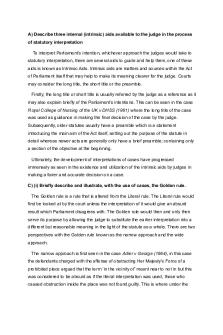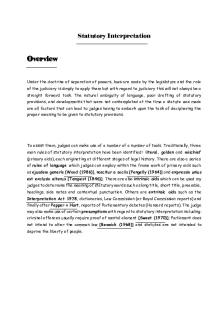Law274,4 Statutory Interpretation PDF

| Title | Law274,4 Statutory Interpretation |
|---|---|
| Author | Mohammad Ali |
| Course | Business Law |
| Institution | INTI International University |
| Pages | 6 |
| File Size | 145.1 KB |
| File Type | |
| Total Downloads | 94 |
| Total Views | 145 |
Summary
INTERPRETATION...
Description
STATUTORY INTERPRETATION
LAW274 BUSINESS LAW
Objectives:
Successful students will be able to:
Explain the statutory rules of interpretation of laws
State common law rules
Introduction
The role of the courts is to apply the will of Parliament. Judges are not allowed to judge cases based on their own opinions.
However, there are situations where statutes need interpretation. Where a statute is clear, the courts must apply the law as it is stated. Where the words of the law are not clear, it is necessary for the courts to interpret the law to determine what Parliament intended to achieve with the law.
Reasons for interpretation of statutes
Statutes are usually interpreted where they are:
-
ambiguous
This is caused by an error in drafting where words inside the law have more than one meaning or there are printing errors.
-
uncertain
This is where the law is meant to apply to different situations and the judge must determine whether the case in front of them falls within the ambit of the law.
Sometimes, a law is uncertain because Parliament has given broad discretion to the judges to decide whether the law is applicable in particular situations. Parliament has done this to allow judges to act equitably. Judges therefore, must interpret the law to see if the law can be applied to the particular case in front of them.
___________________ Jeyanthi-Zee/07
1
STATUTORY INTERPRETATION
LAW274 BUSINESS LAW
Examples of words in the law which give discretion to the judges to decide if the law can be applied to the case in front of them are “reasonable”, “fit and proper”. (1) Statutory Interpretation Rules
The Commonwealth and the States of Australia have passed Acts to interpret other Acts. Collectively, these are known as the Acts Interpretation Acts.
The law passed by the Commonwealth is the Acts Interpretation Act 1901, which was amended in 1981. The effect of this law is that the courts are required to give importance to the purpose and objects of the law when interpreting the Act. The various State Acts Interpretation Acts have the same requirement of courts.
The effect of the Acts Interpretation Acts are that the courts must check the intended purpose of the law, rather than strictly following the words used inside the law. This is known as the purposive approach.
a. National Employers Mutual General Insurance Association Ltd v Manufacturers Mutual Insurance Ltd (1989) When the wording of an Act raises doubts whether Parliament intended that meaning, a court is entitled to ignore the normal meaning of the words.
b. Further, Bermingham v Corrective Services Commission of New South Wales (1988) When using the normal, ordinary meaning of the words results in an unjust decision, it is understood that Parliament did not intend the exact meaning of the words to be applied.
c. The court can imply words into the law if the following conditions are fulfilled: i.
The court must know what problem is intended to be addressed by that law;
ii.
The court must be of the opinion that Parliament mistakenly left out a situation which ought to have been covered by that law; and
___________________ Jeyanthi-Zee/07
2
STATUTORY INTERPRETATION
iii.
LAW274 BUSINESS LAW
Courts must state with certainty what, in its opinion, are the words which Parliament would have used if Parliament had considered that situation when making that law. Bermingham’s case
d. Nevertheless, if the words in the statute are clearly stated, then the courts must give effect to those words even if they think that the law is not a good law.
(2) Common Law Rules Judges may use either of the following three rules. The rule used depends on the judge hearing the case.
a. Literal Rule b. Golden Rule c. Mischief Rule
a. Literal Rule Judges who use this rule, give the words in the law the natural, ordinary meaning of the words. If the words are clear, the judge does not look for Parliament’s intention in enacting that law.
Cooper Brookes (Wollongong) v Commissioner of Taxation a. If the language of the law is clear, the natural, ordinary meaning of the words must be used; b. This meaning is used even if it results in an unfair and unreasonable decision. However, this rule must be considered in the light of the Acts Interpretation Act.
b. Golden Rule
This type of judge follows the literal rule but is concerned over the decision. As far as possible, this judge tries to apply the natural, ordinary meaning of the words in the law when making his decision. ___________________ Jeyanthi-Zee/07
3
STATUTORY INTERPRETATION
LAW274 BUSINESS LAW
However, if using the natural, ordinary meaning of the words result in an unjust or unreasonable decision, the judge will not follow the meaning of the words. Nevertheless, the ordinary meaning of the words will only be ignored only so far as to avoid an unjust decision.
Gray v Pearson
Again, this rule must be seen in the light of the Acts Interpretation Act.
c. Mischief Rule
When the words of a law may be ambiguous or the law is uncertain, the judge will check why the law was passed by Parliament in the first place.
While this rule seems to be based on the purposive approach, the difference is that the judge using this rule will only check the purpose of this law if the words are ambiguous or the situation is uncertain.
Despite all these common law rules, the statutory rule is the most important source of law and therefore, courts must apply the interpretation rules under the Acts Interpretation Acts rather than the common law rules.
(3) Intrinsic Materials
a. Definition sections (interpretation sections) Every law has a definition or an object section to assist judges to correctly interpret some of the more common words inside the law.
b. Ejusdem generis rule
Where a general word immediately follows a class of specific words, the interpretation of the general word is limited to give it a meaning which will make it fit the specific words.
___________________ Jeyanthi-Zee/07
4
STATUTORY INTERPRETATION
LAW274 BUSINESS LAW
Example: An Act of Parliament may prohibit the possession, without lawful excuse, of “heroin, opium, cocaine, marijuana and any other drugs.” The phrase “…any other drugs” does not mean all other drugs but drugs of the same class as those preceding them. Therefore, possessing penicillin is not within the offence whereas possessing cannabis will be within the Act. (4) Extrinsic Materials
a. Acts Interpretation Act
b. Other materials
Section 15 of the Commonwealth AIA states that in determining the meaning and purpose of the law, courts are allowed to refer to the following external materials:
i.. Relevant Royal Commission and Law Reform Commission reports laid before Parliament before the law was proposed.
ii. Relevant parliamentary committee reports.
iii. Speech of the Minister during the second reading of the Bill in Parliament (Hansard).
Catlow v Accident Compensation Commission (1989) Extrinsic materials should only be looked at if the ordinary rules of statutory interpretation have not proved to be helpful.
Tutorial
1. Explain the reasons for statutory interpretation.
___________________ Jeyanthi-Zee/07
5
STATUTORY INTERPRETATION
LAW274 BUSINESS LAW
2. What are the common law rules of statutory interpretation?
3. How does Parliament direct the courts to interpret statutes?
4. Explain the conditions under which outside sources may be referred to by the courts.
___________________ Jeyanthi-Zee/07
6...
Similar Free PDFs

Statutory Interpretation
- 6 Pages

Statutory Interpretation
- 6 Pages

Statutory Interpretation
- 3 Pages

Statutory Interpretation
- 5 Pages

Statutory Interpretation
- 11 Pages

Statutory Interpretation
- 6 Pages

Statutory interpretation notes
- 2 Pages

Statutory Interpretation 70102
- 5 Pages

Statutory Interpretation in Malaysia
- 12 Pages

Statutory Interpretation Notes
- 9 Pages

Statutory Interpretation Notes
- 4 Pages
Popular Institutions
- Tinajero National High School - Annex
- Politeknik Caltex Riau
- Yokohama City University
- SGT University
- University of Al-Qadisiyah
- Divine Word College of Vigan
- Techniek College Rotterdam
- Universidade de Santiago
- Universiti Teknologi MARA Cawangan Johor Kampus Pasir Gudang
- Poltekkes Kemenkes Yogyakarta
- Baguio City National High School
- Colegio san marcos
- preparatoria uno
- Centro de Bachillerato Tecnológico Industrial y de Servicios No. 107
- Dalian Maritime University
- Quang Trung Secondary School
- Colegio Tecnológico en Informática
- Corporación Regional de Educación Superior
- Grupo CEDVA
- Dar Al Uloom University
- Centro de Estudios Preuniversitarios de la Universidad Nacional de Ingeniería
- 上智大学
- Aakash International School, Nuna Majara
- San Felipe Neri Catholic School
- Kang Chiao International School - New Taipei City
- Misamis Occidental National High School
- Institución Educativa Escuela Normal Juan Ladrilleros
- Kolehiyo ng Pantukan
- Batanes State College
- Instituto Continental
- Sekolah Menengah Kejuruan Kesehatan Kaltara (Tarakan)
- Colegio de La Inmaculada Concepcion - Cebu




